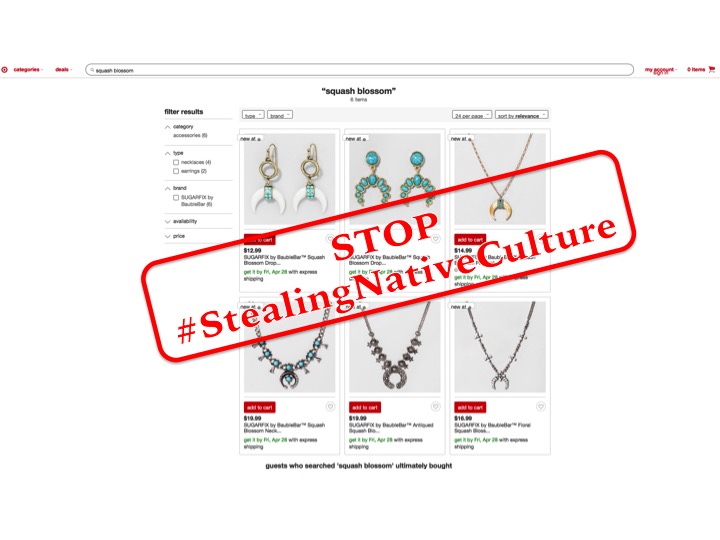About a month ago, I wrote a Dear Torrid Letter about Torrid ripping off Navajo culture by selling a knock-off of the iconic Navajo Squash Blossom Necklace. Within two days Torrid apologized, agreed to stop selling the necklaces, and donated the profits to the Indian Arts and Crafts Association. Almost immediately after publishing the issue on my blog I was notified by friends and strangers of knock-off Navajo Squash Blossom Necklaces being sold at Walmart and other retail stores. Most recently, Target is profiting off stolen Native culture.
#StealingNativeCulture
A fellow Instagrammer, Marissa Gonzales, notified me about Target selling Squash Blossom Necklaces branded by BaubleBar for Target’s “SugarFix” jewelry partnership.
A quick search of Target’s online store shows they are actually selling six different squash blossom jewelry items as part of the BaubleBar SugarFix partnership, which launched January 31, 2017.
The product descriptions even use terms that would be associated with styles of Navajo Squash Blossom Necklaces: “antiqued silver beads”, “antiqued squash blossom necklace”, and “antiqued silver finish”.

Screenshot of Target’s online store from April 26, 2017 showing a search for “squash blossom” items. The search returned six items, two sets of earrings and four necklaces.
SUGAR FIX by BaubleBar for Target
So, there are two situations happening here. The first is that BaubleBar designed (or bought and resold) necklaces that clearly resemble the iconic Navajo Squash Blossom Necklace design. Secondly, Target agreeing to sell and profit off these items.
What gets me is that the knock-off jewelry designs were most likely reviewed by a team of people from both BaubleBar and Target… and no-one on that team thought this concerning? Where are the legal experts to chime in that these designs may potentially be protected under a U.S. federal law, the Indian Arts and Crafts Act? Or that Urban Outfitters recently settled with the Navajo Nation for claiming products were Navajo that really weren’t and that Target/BaubleBar should reconsider? While BaubleBar and Target may think they can skirt this issue because they’ve branded the products Sugarfix by BaubleBar, in reality they are stealing a cultural design that Navajo artists rely on for their livelihoods. Despite the legal concerns (I’m not a lawyer!), ethically BaubleBar and Target are in the wrong.
Collaboration
Target is clearly open to collaboration as they’ve partnered with BaubleBar to create SugarFix. Advocates of American Indian cultural intellectual property rights have stressed that retailers, such as Target, Walmart, Torrid, etc., should seek out collaboration with actual American Indian designers. Although such designers may not be into exploiting an iconic design, such as the Navajo Squash Blossom Necklace, for “fast fashion” (come on that low quality manufacturing looks too cheap for the elegant Navajo Squash Blossom Necklace), there are many American Indian designers who have designed their own jewelry lines who I may guess might have interest in partnering with a big box company to bring their designs to a larger audience. Such partnerships can be a win-win for both the retailer, as then they may avoid issues of cultural appropriation, and for American Indian designers who get their name heard and their jewelry into the hands of more people.
In addition, these instances of cultural appropriation from big box retailers have me questioning the diversity of employees that work on these collaborations and product designs. It is not only American Indian culture that is appropriated but other cultures, who have histories of being oppressed, their significant and sometimes sacred items are being commodified often without input or benefit to those communities.
What Can You Do About This?
When I learned that Torrid was selling a knock-off Navajo Squash Blossom Necklace, initially I felt like it was too big of an issue for lil ol’ me to tackle. I for sure didn’t expect Torrid to respond in the positive manner that they did, although I had hoped they would. But I went ahead and made an effort as I knew that I couldn’t just let it slide by – the issue meant too much for me to stand by.
Similarly, I hope by bringing these issues forward that ultimately these companies will change their ways (but I’m not going to hold my breath) and perhaps more importantly that it inspires someone to take action. If you see a company ripping off your culture, go ahead and feel angry and upset, and then take action. Use those emotions to write a letter. Tweet or give them a call (although I don’t advocate yelling at people). And tell others to support your efforts.
Are you seeing these knock-off Navajo Squash Blossom Necklaces in person at your local Target? If so, post a photo to Instagram or Twitter, use the hashtag #StealingNativeCulture, and tell @Target and/or @TargetStyle what you think.
-Nicky



